| BACKGROUND
SCREENING NEWS |
Is
"Safe Harbor" No Longer Safe? EU to Review Regime for Personal
Data Transfers to the U.S.
In a dramatic announcement, EU Commissioner Viviane Reding stated
that the European Commission will be reviewing its Safe Harbor
Agreement with the U.S. This review will be keenly awaited by
many companies and other organisations who currently rely on
the Safe Harbor Agreement to transfer personal data lawfully
between the EU and the U.S. Reding stated that the recent PRISM
controversy was a "wake-up call" which Europe would answer with
"data protection reform". In that context, Reding said the "Safe
Harbor agreement may not be so safe after all" as it could be
used as a "loophole" for data transfers from the EU to the U.S.
despite "U.S. data protection standards [being] lower than our
European ones". As a result, she stated that she will be working
on "a solid assessment of the Safe Harbor Agreement." If the
Safe Harbor Agreement were to be suspended or even revoked by
the EU, then personal data would no longer be able to be lawfully
transferred from the EU to the U.S. unless some other lawful
method were in place. A more likely outcome is for the EU to
seek to negotiate the Safe Harbor Agreement following the European
Commission's review. However, the criticism surrounding Safe
Harbor may lead many companies and other organisations increasingly
to consider binding corporate rules as the key legal compliance
method to underpin their international personal data transfers.
Read
more

Background
Checks as the New Racism
The Obama
administration has a schizophrenic attitude toward requiring
people to go through criminal-background checks. Senator John
Cornyn recently grilled Kathleen Sebelius, the Health and Human
Services secretary, about why the 45,000 "navigators" who assist
people in signing up for Obamacare aren't required to undergo
a criminal-background check, even though they handle sensitive
personal information. However, the risk that unscrupulous or
untrustworthy people could hold federally funded jobs certainly
concerns the Obama administration in other contexts. In 2009,
Robert Groves, President Obama's handpicked director of the
U.S. Census Bureau, announced that every one of the 1.4 million
people he would hire for the next year's national head count
would be investigated and fingerprinted and felons wouldn't
be hired. Most Americans would be angry to learn that the kind
of vigorous background checks census workers underwent just
three years ago have been abandoned in the case of Obamacare
navigators. After all, the personal data the navigators will
handle is even more sensitive than what census workers were
tabulating. Today, all too often, skin color trumps all: Race
is often used as the basis for preferring one job applicant
or college student to another. But under the EEOC's guidance,
employers who try to factor in the content of one's character,
at least as revealed by one's criminal record, risk costly litigation
and stigma.
Read more

Target Hits the Bulls Eye
When Target says, "Expect More, Pay Less," who knew the "more"
would include an effort to uphold Title VII of the Civil Rights
Act of 1964? Yet, that's exactly what the Minneapolis-based
company did when it decided to remove questions about criminal
history from its job applications throughout the country. Today,
more than 90% of employers conduct criminal background checks
on some or all job applicants (up from 51% in 1996), according
to a 2010 SHRM survey. This ramped-up use of background checks
adds yet another major hurdle to the job prospects of a vast-and
unfortunately- growing segment of U.S. workers. An estimated
65 million people in the U.S.-or one in four adults-have an
arrest or conviction record that can show up on a routine criminal
background check for employment. The problem is especially severe
for African Americans and Latinos, who are disproportionately
impacted by the criminal justice system and have historically
higher rates of unemployment. Each year, millions of people
with criminal records, a newly manufactured underclass of citizenship
in the U.S., face a maze of policies and regulations that keep
them from rebuilding their lives and becoming functioning members
of society. By tackling one of the most important Civil Rights
issues of our time, Target is giving formerly incarcerated job
seekers an opportunity to fairly compete for employment.
Read
more

Stranger at the Door; Be Careful Who You Let Inside
for Service Work
While most service workers are not a threat, there have been
reports across the country of companies sending dangerous criminals
into people's homes. In most cases these companies don't do
background checks on their employees. For nearly ten years Lucia
Bone has been on a relentless campaign, pushing for federal
legislation that would require thorough background checks to
be done on all in-home service workers. Her inspiration is a
personal tragedy that occurred when her sister was raped and
beaten to death in her home when an air duct cleaner returned
to her house 6 months later. The department store who hired
the killer had not done a background check. Bone has since formed
a non-profit organization that urges businesses to get the Cause
Certification, which means they conduct annual high-standard
background checks on all in-home service workers voluntarily.
However, she says most business owners don't want to foot the
bill for proper background checks. Bone says there are four
questions you should always ask: 1. Do you perform criminal
background checks on your employees and subcontractors? 2. When
are the background checks performed? 3. Which background screening
company do you use to perform background checks? 4. How can
I be assured that the person being sent into my home has had
a criminal background check performed?
Read more



| BACKGROUND
SCREENING NEWS - continued |
Bosses
May Use Social Media to Discriminate Against Job Seekers
A new study
suggests that many companies regularly look up job applicants
online as part of the hiring process and may also use what they
find to discriminate. The study, a Carnegie Mellon University
experiment involving dummy résumés and social-media
profiles, found that between 10% and a third of U.S. firms searched
social networks for job applicants' information early in the
hiring process. In those cases, candidates whose public Facebook
profiles indicated they were Muslim were less likely to be called
for interviews than Christian applicants. The difference was
particularly pronounced in parts of the country where more people
identify themselves as conservative. In those places, Christian
applicants got callbacks 17% of the time, compared with about
2% for Muslims.
The same
experiment, conducted from February to July of this year, found
that online disclosures about job candidates' sexuality had
no detectable impact on employers' early interest.
The research
is the latest example of how people's digital trails can have
far-reaching and unintended effects, particularly in the job
market. Employment experts said the results show that businesses
should be more careful about allowing people who make hiring
decisions to look up candidates online. " James McDonald, a
partner at Fisher & Phillips LLP said, "You need to control
the information you receive so you're only getting information
that is legal for you to take into account."
Read more

First
Advantage Enhances Resident Screening Through Integration With
Experian RentBureau®
First Advantage,
a Symphony Technology Group (STG) company and the leading global
provider of screening analytics and identity solutions, today
announced details of its collaboration with Experian RentBureau
®, the
largest rental payment database in the multifamily industry.
Through this strategic collaboration, data from Experian RentBureau
is linked to First Advantage's resident screening solution to
help housing providers identify residents who may pose the greatest
risk of skipping or making late payments.
As the
largest and most widely used credit reporting agency for the
multifamily housing industry, Experian RentBureau receives rental
payment data daily from a national network of more than 400
property management companies. By integrating this Experian
data with First Advantage's resident screening solutions, property
managers will have a thorough, streamlined process to view their
applicants' background information including their positive
or negative rental history. As a result of this enhanced offering,
First Advantage clients benefit from receiving rental payment
history at the same time as their existing tenant screening
data, delivering instant insight into the factors that shape
their applicant selection processes.
Read More

| Welcome
to the U.S. Legal Challenge Question! |
Sponsored By:


As the background
screening industry continues to get more competitive the firms
that will ultimately succeed will be those that create competitive
advantage through their people by offering continuous learning
opportunities to heightened their knowledge and capabilities.
We believe that having employees that are very knowledgeable about
the legal landscape of background screening is essential to continued
success.
We are grateful
to Larry D. Henry who began his law career with the Army JAGC
where he tried over 2,000 cases. After the Army he relocated to
Tulsa. In 1981, the founder of DAC Services contacted Mr. Henry's
firm for assistance in creating a background screening company.
Since Mr. Henry's practice was employment law, the firm believed
this fell within his area and as they say: "the rest is history".
His practice has kept him in continual contact with the background
screening industry, and he is a nationally recognized expert in
the area of background screening.
Mr. Henry's
practice is concentrated on employment law and in specific, background
screening of employees. He represents consumer reporting agencies
throughout the United States and two national trade associations.
He is the author of the Criminal Records Manual and the on line
reference site:CRAHelpDesk.com, and he is a frequent presenter
across the country on various topics dealing with background screening.
Please choose
your answer by clicking on it:

Is
Mickey in Trouble? Disney Defends its Background Screening Policies
The company known for their signature character, Mickey Mouse,
is defending a class action claim based on questions about its
background screening policies. A lawsuit was filed against the
Walt Disney Co. and the complaint alleges that Disney's policy
for notifying applicants about background checks has violated
the FCRA. The plaintiff is alleging that Disney failed to provide
notice of adverse action, a process required by the FCRA when
an adverse employment decision is based on any portion of a background
check pursuant to 15 USC 1681b(b)(3) and 15 USC 1681m(a). The
plaintiff's background check showed a criminal conviction that
had later been expunged. The plaintiff's argument is that Disney
did not give him the opportunity to clear up the inaccuracy of
the report. Instead, the company took action and made the decision
not to hire based on inaccurate information that the Plaintiff
never had the opportunity to cure. Employers should make sure
to have a policy for adverse action procedures that includes both
pre-adverse and adverse action notifications, and that all hiring
managers under-stand the need to follow those policies with a
uniform process. The best practice is to reasonably evaluate each
decision, and when you can, give the job applicant the benefit
of notice. By doing so, you might avoid being the next class action
defendant.
Read more

Walt Disney Company and First Choice Background Screening
are Subjects of FCRA Class Action Claims
Two class
action complaints were filed recently in the Superior Court of
California County of Los Angeles court alleging violations of
the FCRA. The cases are Culberson v. The Walt Disney Company
and Ruffing v. First
Choice Background Screening . The claim against Disney is
that they knowingly violated the FCRA by failing to provide job
applicants and employees with pre-adverse and adverse action notices
and a copy of their back-ground check report. First Choice Background
Screening is charged with multiple FCRA violations, including
not using reasonable procedures to assure maximum possibly accuracy
of the reports as well as strict procedures regarding the reporting
of public record information. Both cases involve employment screening
and should serve as a reminder to employers and consumer reporting
agencies (CRA) to be mindful of their obligations under the FCRA.
For CRAs it is important to consider the disclosure and authorization
template you provide your end-users to ensure that it does not
contain additional verbiage that could be challenged by plaintiff's
counsel as a notice which is not a "clear and conspicuous disclosure".
For employers, whether it is handled by your CRA or internally,
when using background check reports for employment screening purposes
you must conduct the pre-adverse and adverse action steps, as
applicable, when using information from such a report prior to
taking any adverse action against the job applicant.
Read more

The Background Backlash Continues - Texas Sues the EEOC
Over its Criminal Background Guidance
For the second
time in less than six months, the EEOC finds itself on the wrong
side of a lawsuit. The State of Texas has sued the EEOC in the
Northern District of Texas seeking declaratory and injunctive
relief against the EEOC for issuing its 2012 arrest and conviction
guidance (the 2012 Guidance). In short, the Texas complaint argues
that the EEOC did not have the authority to issue this rule. The
lawsuit also claims that the EEOC's
position that Title VII trumps conflicting state laws violates
its state sovereignty. As it stands, Texas state law allows for
blanket, no-felons policies at certain state agencies. Through
this lawsuit, Texas, in its role as an employer, attempts to preemptively
force the EEOC to defend its 2012 Guidance. The 2012 Guidance
fails to specifically inform employers what they can do when considering
felons for employment, but rather merely
outlines what the Commission believes that employers cannot do.
Importantly, this lawsuit follows a pointed
letter from nine Attorneys General stating that the 2012 Guidance
is "misguided and a quintessential example
of gross federal overreach" and attempts in Congress to prohibit
the EEOC from spending funds enforcing the 2012 Guidance. The
implications of cases like these will likely clarify the bounds
of how courts will view the EEOC's interpretation of Title VII
in this area.
Read more

Reefer
Madness: Employees May Use Medical Marijuana Yet Be Fired For
Doing So
Despite twenty
states allowing the use of medicinal marijuana and two more -
Colorado and Washington - allowing recreational marijuana use,
employers remain unaffected. Courts consistently find that employers
may terminate employees who test positive for marijuana, regardless
of whether employees are using marijuana to
treat a disability; whether they were not under the influence
on company time; or whether they used or possessed marijuana on
company premises. In fact, state courts in Colorado, Michigan,
Washington, Oregon, Montana, and California as well as the 6th
and 9th Circuits agree on two key points that allow employers
the option of continuing zero-tolerance approaches to drugs. First,
employees may be disciplined or terminated for marijuana use,
despite state statutes prohibiting discipline for engaging in
lawful activity outside of work. Second, employers need not accommodate
medical marijuana use as a disability-related condition. Marijuana
remains illegal under federal law; thus, it does not have the
same status as other prescription drugs. Until marijuana becomes
legal under federal law or until state statutes allowing medical
marijuana explicitly address marijuana in the workplace, employers
have the option to continue to ban users of that drug. Employers
should update their Drug-Free Workplace Policy and review their
drug testing protocols to ensure that it complies procedurally
with applicable statutory law and that it is conducted both accurately
and with appropriate measures to avoid tort claims for invasion
of privacy.
Read more

Lesson for Workplace Drug Tests in Convicted Probationer's
Suit against Lab for Positive Result
The New York
Court of Appeals' 4-3 decision allowing subjects of drug tests
to sue laboratories for "negligent testing" may hold a lesson
for employers who desire to test their employees, particularly
when conducting on-site testing using specimens other than urine.
It illustrates risks that attend employment-related drug testing,
although the issue in the case was whether a laboratory that contracted
with a county probation department to analyze drug tests performed
on probationers may be liable to a test subject for a negligent
drug test. New York's highest court established a new negligence
cause of action against a drug testing laboratory, allowing a
test subject to sue the laboratory despite the absence of any
contractual relationship, but rendered no opinion on whether the
laboratory was negligent. Accepting the plaintiff's allegations
as true for purposes of deciding whether a suit could be brought
at all, a majority of the court said a negligence claim could
be advanced where a laboratory did not exercise reasonable care
in the testing of the plaintiff's biological sample by failing
to adhere to professionally accepted testing standards and consequently
releasing a report finding that the plaintiff had tested positive
for THC. Without addressing the merits of the complaint, the likelihood
that any particular employment drug test result may be questioned
can be reduced by adopting a conservative approach to testing.
Read
more

Last Chance Drug and Alcohol Use Policy Did
Not Violate ADA
Some employers
believe in giving employees a second chance. When the reason for
taking action is related to drug or alcohol use, employers frequently
require employees to agree to certain terms as a condition of
returning to work. Often, these conditions are memorialized in
a "last chance" or other agreement whereby the employee foreswears
use of drugs or alcohol, agrees to increased testing, counseling
or other conditions. The Third Circuit Court of Appeals recently
upheld the use of such agreements in the face of a claim of disability
discrimination under the ADA. The case involved an alcoholic driver
who was never caught intoxicated or drinking at work, but requested
FMLA leave for treatment. He was required to sign the last chance
agreement as a condition for returning to work. When he again
requested FMLA leave after a relapse, he was terminated for drinking
alcohol in violation of the agreement's terms. He sued under the
ADA and FMLA, contending that the last chance agreement impermissibly
screened out disabled persons and interfered with his right to
take FMLA leave. The Third Circuit rejected these claims, noting
that the return to work agreement was reasonable. The Court was
influenced by DOT rules regarding driver alcohol use. For jobs
without this clear safety component, last chance agreements should
be tailored to focus on the effects of drug or alcohol use on
job performance.
Read more

Beyond
Breach Prevention: The Need for Adequate Response
If there's been any lesson learned in the past decade,
it's that despite tens of billions having been spent on anti-malware,
firewalls, intrusion-detection and prevention systems, and other
defensive technologies, it's just not realistic for enterprise
security teams to expect to be able to stop every attack. Yet,
surprisingly, enterprises focus their efforts and their budgets
as if they can do precisely that. Sourcefire (recently acquired
by Cisco) founder and CTO Martin Roesch, says a recent analysis
by the IT security firm found that enterprises currently often
only spend as little as 10% on incident response and about 30%
on detection: the rest is on prevention. While preventing successful
attack attempts from becoming breaches is the ideal, there needs
to be more of a focus on an organization's ability to identify
breaches -- especially advanced malware -- as an attack is underway.
The ability to spot malware in-progress is a crucial part of maintaining
the operational integrity of one's environment, says Roesch. To
quickly identify breaches in-progress, more enterprises are turning
to breach detection systems, which purport to pick up where intrusion
detection systems and anti-malware software often fail and spot
malicious files and malware as a successful attack is underway.
That ability to detect changes in the environment is crucial if
organizations are going to get better at combating advanced threats,
added Roesch.
Read more


| DATA
PROTECTION - continued |
Government
Report Calls For Comprehensive Privacy Law
A new report
on consumer privacy from the Government Accountability Office
concludes that there ought to be a comprehensive federal law governing
the collection, use and sale of personal information by companies
since there currently is none. The just-released report on "information
resellers" was requested in June 2011 by Sen. Jay Rockefeller
(D-W.Va.), who last year launched an investigation into the privacy
practices of data brokers. Earlier this year, Rockefeller, chairman
of the commerce committee, reintroduced his Do Not Track Act.
The report focuses primarily on the privacy issues related to
consumer information used for marketing. Between August and September,
the GAO reviewed the current laws, regulations and enforcement
actions and talked to representatives from government, consumer
and privacy groups, trade associations and data broker companies.
"Congress should consider strengthening the current consumer privacy
framework to reflect the effects of changes in technology and
the marketplace, particularly in relation to consumer data used
for marketing purposes," the report said. Specifically, the GAO
recommended lawmakers consider giving consumers more information
about what information is held about them, who holds it, and the
ability to access, correct and control that information. A more
comprehensive privacy law should also address privacy controls
for new technologies, including online tracking and mobile.
Read more

Getting
Rid of Consumer Report Information with the Disposal Rule
Businesses
commonly use consumer reports when deciding whether to make a
job offer or extend a line of credit. In the wrong hands, consumer
reports may also be used to commit fraud and identity theft. This
is why the Federal Trade Commission (FTC) enacted the Disposal
Rule. As required by the Fair and Accurate Credit Transactions
Act (FACTA), the FTC's Disposal Rule requires the use of reasonable
disposal measures to protect against unauthorized access to or
use of consumer information. Individuals and businesses of any
size that use consumer reports for business purposes must comply
with this rule. The Disposal Rule, which simply requires reasonable
disposal measures to prevent unauthorized access to or use of
consumer information, is designed to be flexible. The rule allows
organizations and individuals to determine what measures are reasonable
by considering the sensitivity of the information, the costs and
benefits of different disposal methods and changes in technology.
The Disposal Rule is but one aspect of protecting against a data
security breach. Organizational protective measures should cover
everything from the wireless network to the copy machine, and
should also include insurance. Various cyber liability products
are available to protect against privacy injuries, such as identity
theft, and to cover the cost of complying with various data breach
notice laws. Given their complexity, an experienced insurance
agent should be consulted to ensure that adequate coverage is
obtained.
Read more

Public
Record Update
Sponsored by:
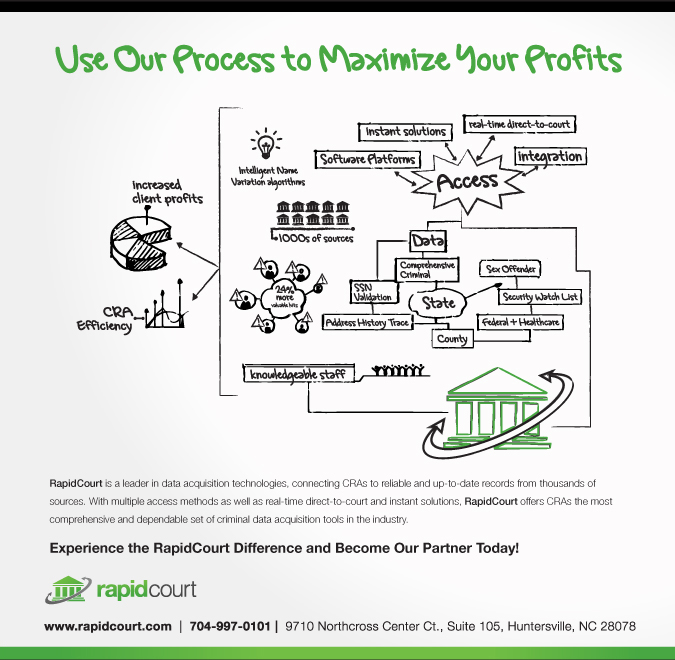
Public
Record Update
By Mike Sankey, PRRN
| Larry
Henry and BRB Publications Launch New HR Version of the
State Rules Register |
Mr. Larry
Henry and BRB Publications launch a new product The HR
Version of the State Rules Register at
the NAPBS 2013 Annual Conference. It is designed very similar
to a private label product. Access is unlimited
from the CRA's site - no log-in is needed.
A CRA can
now provide their clients with an easy-to-use and up-to-date tool
showing individual state restrictions placed on HR, hiring managers,
and landlords.
See www.CRAHelpdesk.com
for details!
| BRB's
FREE RESOURCE CENTER |
For the MOST
COMPREHENSIVE RESOURCE describing all access methods, restrictions,
fees, and search procedures on over 26,000 government and private
agencies visit the Public Record Research System (PRRS-Web) .
We provide the extensive details and in-depth data you will not
find doing a Google search!
For more
information contact Michael Sankey at mike@brbpublications.com
or visit www.brbpublications.com/updates.aspx

Peopletrail
TM Announces Its
"Help For The Holidays" Program Providing Discounted Employee
Background Check and Screening Services During The Busy Holiday
Season
Peopletrail
- a leading provider of employee and tenant background checks
and screening solutions - announced today its "Help for the Holidays"
program. The program provides new customers available resources
at discounted rates to help make the right hiring decisions during
the busy holiday season.
The consequences
for rushing the employee screening process and making a bad hiring
decision are significant. The Society For Human Resource Management
reports that the average settlement of a negligent hiring lawsuit
is nearly $1 million. And according to CareerBuilder.com, 43%
of those surveyed reported the top reason for why bad hires happen
to good people is because of the need to fill the job quickly.
The "Help
for the Holidays" program provides new customers an initial free
employee background check and screening with a 20% discount on
all additional screening during the busy holiday season. The program
will run for two months from November 12, 2013 to January 12,
2014.
Read
more

Gall
& Gall Acquired with help of Berg Consulting Group
 |
Gall
& Gall, a retail CRA for twenty six years, has been acquired,
with Berg Consulting Group working for the seller to find
the best buyer. The buyer wishes to remain anonymous. The
buyers wishes to remain anonymous. |

SHRM
Leading Indicators of National Employment® (LINE®)
EMPLOYMENT
EXPECTATIONS
In November,
the hiring rate will rise in manufacturing and services compared
with a year ago. Manufacturing was up + 6.8 and Services was up
+ 0.4.
RECRUITING
DIFFICULTY
In October,
recruiting difficulty rose modestly in manufacturing and services
compared with a year ago. Manufacturing was up + 6.1 and Services
was up + 5.9.
Source:
November 2013 SHRM LINE Report



What
Can We Do For You in 2014 To Help You Exceed Your Revenue
Goals? |
Targeted
Marketing Support Services for the Background Screening Industry
PreemploymentDirectory.com
Online background
screening directory featuring background screening firms and suppliers
to the background screening industry. Basic, Gold, Platinum and
Diamond levels of advertising are available. Target audience is
the Human Resources, Talent Acquisition and Recruiting community.
New Opportunities:
Annual Background Screening
Industry Buyers Guide
An annual
print and electronic publication featuring U.S. and international
background screening firms, and timely informative articles. The
Guide is launched annually in June at the SHRM Annual Conference
and distributed to 20,000 plus human resources professionals.
Annual Suppliers to
the Background Screening Industry Buyers Guide
An annual
print and electronic publication featuring suppliers to the background
screening industry. The Suppliers guide is distributed to our
database of more than 1,600 background screening firms and at
relevant professional trade shows.
The Background Buzz
A monthly
e-newsletter distributed to the worldwide background screening
industry that offers comprehensive coverage of information and
news relevant to the screening industry. The e-newsletter is distributed
to more than 1,600 firms in the background screening industry
and accordingly, is an exceptional advertising venue to reach
background screening firms.
The Special International
Edition of The Background Buzz
A supplement
to the regular edition of The Background Buzz that is
published on a bi- monthly basis featuring global information
and news on background screening around the world.
eDirect Mail Campaigns
On demand
e-blast service sent to our database of more than 1,600 firms
in the background screening industry. Each e-blast includes your
advertisement and one relevant article.
Media Releases and Announcements
On demand
releases and announcements to targeted media outlets in the background
screening and recruiting industry.
Private Label Newsletter
Service
Custom designed
e-newsletter service. We create a custom designed e-newsletter
including recommending the name, designing the header, template
and providing the content. Distribution frequency options include
monthly, bi-monthly and quarterly.
See
the Marketing Portfolio that matches your market segment
:
1. U.S. Background Screening
Industry Marketing Portfolio
2. International Background
Screening Industry Marketing Portfolio
3. Suppliers to the Background
Screening Industry Marketing Portfolio

STOP
STRUGGLING WITH WRITING AND PUBLISHING YOUR NEWSLETTER: |

We can help
you have a high quality e-newsletter to help nurture your relationship
with your clients and attract new clients. Our customized newsletter
service will take over your newsletter task or create a new one
for you. We can manage the creation of your newsletter for you.
We are constantly
researching information to use for The Background Buzz and
you can put our research to use for you. Using the information
rich content from The Background Buzz (minus the ads
and competitors information) we will create a custom newsletter
for you.
Use your staff’s
time to do more valuable work and save all the hassle of researching
or writing articles, formatting and managing all the other ezine
tasks with our customized ezine process.
Contact Barry
Nixon at 949-770-5264 or at wbnixon@aol.com
for more information.

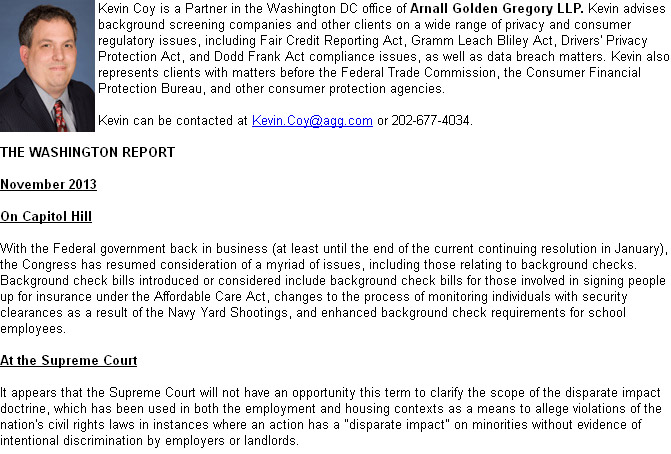
Read
the full report

One
Site! Many Suppliers! |
VISIT
THE NEW SUPPLIER/PROVIDER SECTION ON
PREEMPLOYMENTDIRECTORY.COM
Looking
for the Top Suppliers in the Industry? Need to find a new Supplier?
Visit our VENDOR
SHOWCASE which features suppliers to the Background
Screening Industry.
Suppliers
to the Background Screening industry Guide Now Available!
Click
here or on image to get a copy
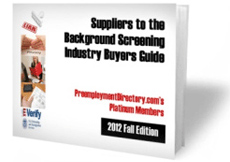
2013
- 2014 Suppliers to the Background Screening industry Guide Coming
Soon!





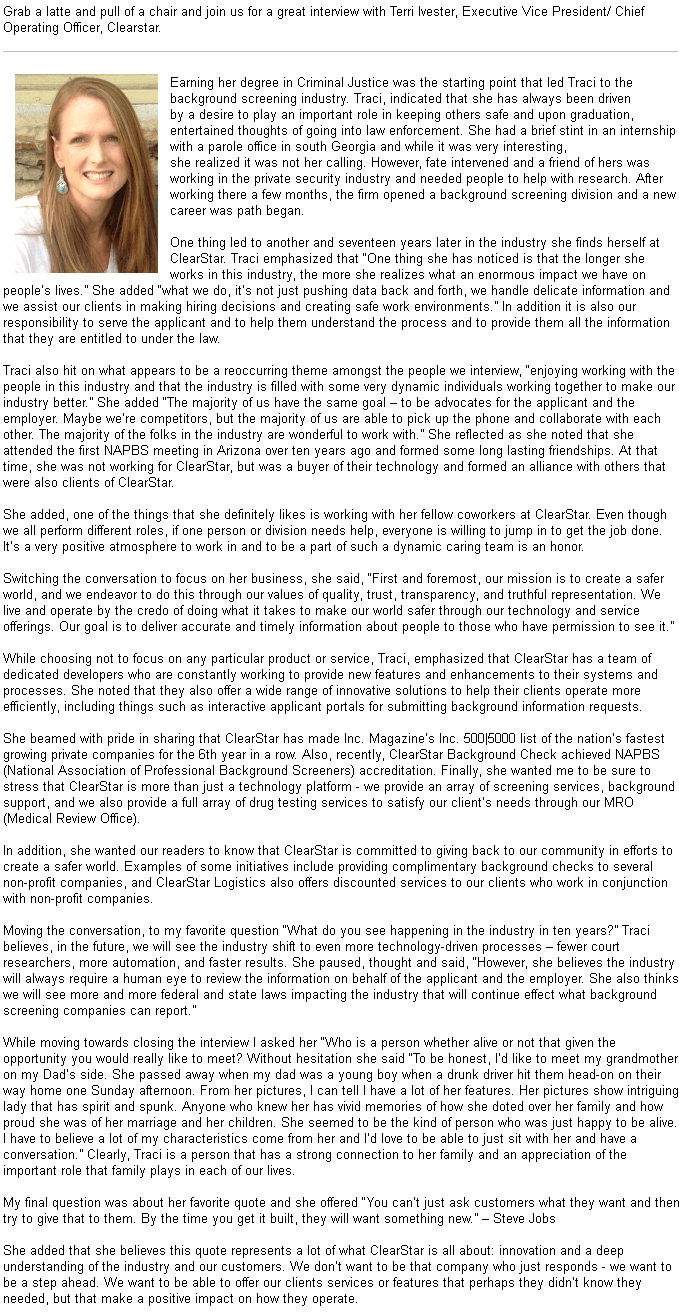
Traci Ivester can be reached at tracii@clearstar.net

| BACKGROUND
SCREENING INSIGHTS |
Credit
Bureau Audits and Accreditation
The Consumer
Financial Protection Bureau issued their guidance on their audits
of the credit bureaus earlier this spring. The credit bureaus,
in turn, are auditing and requesting compliance information from
their resellers-CRAs.
I have in
front of me a request to a CRA from one of the major bureaus.
It is in spreadsheet form, with numerous "discussion topics."
The column next to these discussion topics is a column titled
"documented evidence." Among the documented evidence requirements
are:
| ·
Information security policy |
·
Dispute handling Policy/procedure |
| ·
Portable media policy |
·
Backup Policy and Procedures |
| ·
Encryption policy/procedure |
·
Physical security policy and procedures |
| ·
Password policy/procedure |
·
Visitor logging |
| ·
Data retention policy/procedure |
·
Employee background check procedures |
| ·
Customer registration/credentialing
·
Subscriber agreement
|
·
Employee security awareness policies/procedures |
With credit
bureau audits, increasing litigation and government action regarding
CRAs, it is clear that documentation is becoming the name of the
game. Documentation is great, but it takes time and doesn't bring
money through the door. As such it makes sense to be efficient
in the process. And to that end, take note: all of the above documentation
from the credit bureau is also required documentation with NAPBS
Accreditation. The above is by no means all of the documentation
required for NAPBS Accreditation and there are a few credit-specific
items not covered by NAPBS accreditation, but there is much that
is common to both.
Read
more



Canadian
Chapter Meets with Canadian IAPP Managing Director
Kris Klein,
Managing Director, IAPP Canada met with the NAPBS Canadian Chapter
to discuss the state of privacy matters in Canada. Kris said it
was encouraging to see so many professionals taking privacy-related
issues seriously, particularly considering the vast amounts of
personal information they broker.
The group
discussed the odd situation whereby some provinces do not have
comprehensive privacy legislation that protects employees. (Kris
subsequently posted on the Canadian IAPP Digest information indicating
that Saskatchewan Commissioner Gary Dixon called on his province
to "fill the gap" ( see ).
Lastly, the
group discussed Commissioner Elizabeth Denham press release announcing
that she will be investigating the entire process of using criminal
record checks as part of the pre-employment screening process.
It looks like her investigation will span both the private and
public sectors.
For more
information on the meeting or to join the Canadian Chapter contact
Michelle Leblond at michelle.leblond@plusonesolutions.net,
Employing
Foreign Workers? You Need to Be Proactive
If you currently
employ, or are considering employing workers from overseas, you
need to be aware of two recent legal developments: the tightening
of the rules hiring foreign workers and the potential cost of
underpaying workers. A recent media report suggests that there
are an estimated 100,000 vacant jobs in Australian agricultural
businesses. The shortage of Australian workers who are interested
in agricultural work suggests that employers in the agricultural
sector will continue to look to foreign labour as a means of filling
the gap. While the Federal Government has tightened laws regarding
the hiring of overseas labour, the Fair Work Ombudsman has stated
that in the last two years it has received in excess of 200 complaints
from foreign workers who claim to have been underpaid. A recent
decision in the Federal Circuit Court of Australia demonstrates
that the Ombudsman and the Courts will not take cases of proven
underpayment of foreign workers lightly. Therefore, it is crucial
that employers meet their workers' minimum pay and condition requirements.
Employers will also need to demonstrate that they have taken reasonable
steps to verify that a worker is not an unlawful non-citizen and
not a lawful non-citizen in breach of a work-related visa condition.
Individuals who fail to do so may be fined $15,300 or imprisoned
for up to 2 years. A company may be fined up to $76,500 for a
single offence.
Read more

Second
Stage Australian Privacy Principle Consultation Begins
The Office
of the Australian Information Commissioner (OAIC) has released
the second stage of Draft Australian Privacy
Principle (APP) Guidelines for public consultation. This
stage includes Apps 6-11. The Australian Privacy Commissioner,
Mr Timothy Pilgrim, said the second stage of these draft guidelines
gives guidance about new requirements for agencies and organisations
in areas such as how they use or disclose personal information,
undertake direct marketing activities and send data off-shore.
A significant
area of change is the off shore disclosure of data covered in
app 8. New accountability requirements will apply to organisations
(including australian government agencies) that send personal
information to an overseas recipient. Australian organisations
will generally remain accountable for the handling of the personal
information by the overseas recipient.
These guidelines
will outline how the office of the Australian Information Commissioner
(OAIC) will interpret and apply the Apps which are central to
new privacy laws that commence on 12 march 2014. The consultation
on apps 6 to 11 is open until close of business Monday 21 October
2013. Please send submissions to consultation@oaic.gov.au
.
Read More

The Sobering Facts About Employee Fraud
One of the
topics I frequently return to is the risk assessment
aspect of a recruiter's job, or the 'defensive' recruitment skills,
such as background and reference checking, that are a necessary
part of doing a complete job as a recruiter. Unfortunately, there
is still an undesirable tendency for these skills to be deemed
an 'admin' part of a recruiter's job.
Read more
Alberta Privacy Legislation Shot Down - Will Also Affect
BC
The Alberta
Personal Information Protection Act has been declared
unconstitutional by the Supreme Court of Canada. The sweeping
decision was prompted by union video surveillance of people crossing
a picket line. Because PIPA does not have any exemption
to allow for a union to advance its interests in a labour dispute,
it was held to be an unreasonable restriction on the union's freedom
of expression guaranteed by the Charter of Rights.
Alberta will have 12 months to make changes to the law before
the declaration of invalidity takes effect.
Read more

B.C.
Criminal Record Checks Spur Privacy Concerns
Concerns
about the amount and type of personal information disclosed in
police record checks have prompted an investigation by B.C.'s
privacy commissioner. Elizabeth Denham says citizens and civil
society groups have raised questions about the scope and sensitivity
of personal information that's accessed and disclosed to police,
often for employment-screening purposes. Denham says thousands
of record checks are processed every year by municipal police
forces and the RCMP but the relevance of the information collected
in the public and private sector needs to be scrutinized. While
a criminal record check is a report of someone's prior convictions,
penalties or outstanding charges pulled from a national police
database, such information can also reveal details that have not
been proven in court. She says some of the issues include a person's
mental health, investigations that did not result in charges and
charges that did not end up in a conviction. Last year, the commissioner
issued a report saying the B.C. government did too many criminal
record checks for employment-related purposes in March 2011 and
that while some were valuable for people working with children,
for example, others were an invasion of privacy.
Read more

Privacy in the Workplace: A New Tort is Born
Over the
last two years, courts have repeatedly addressed a new form of
workplace violation. With these decisions they have begun transforming
the face of privacy law in the workplace. With technology being
a tool at the forefront of many workplaces, personal information
has become vulnerable data requiring protection. In two recent
cases, the Ontario Superior Court of Justice and the Court of
Appeal for Ontario both recognized this vulnerability along with
the existence of the tort of invasion of privacy in Ontario. This
new tort was based upon an actionable "intrusion upon seclusion".
The Court defined this intentional tort as being one where the
intrusion into the seclusion of another person's "private affairs
or concerns" would be found as "highly offensive to a reasonable
person". In terms of changes to employment law, these decisions
added the welcomed caveat to an employer's obligation to protect
its employees' privacy in the workplace. For employers, this change
means that a breach of this obligation could potentially expose
them to punitive damages up to $20,000. For employees, it means
among other things, that they can have a "reasonable expectation
of privacy" in their workplace while using technological tools
provided by their employers in the course of their employment.
Read more

Frequently
Asked Questions About Employee Background Checks
This article
covers some of the most common questions asked about employee
background checks in Canada. Question topics include: Credit Checks,
Drug and Alcohol Testing, Medical Examinations and Criminal Background
Checks. Here are a few of the questions and answers: Is an
employer allowed to perform a credit check on an employee or prospective
employee? An employer may perform a credit check on an employee
or prospective employee if the employer intends to use the information
for employment purposes. Such purposes include considering new
hires, granting promotions, reassigning employment duties or determining
whether to retain someone as an employee. Who can be subjected
to a drug/alcohol test? Any employee may be subjected to
a drug/alcohol test, however, drug and alcohol testing that has
no demonstrable relationship to job safety and performance has
been found to be a violation of employee rights. Can an employer
decline to hire a prospective employee or terminate an employee
based on the results of the criminal background check? A
decision not to hire someone based solely on the fact that he
or she has a criminal record is discriminatory under the Code.
However, an employer would not be discriminating if it makes the
decision regarding employment based on a record of offence that
closely relates to an important quality of the job. If a person
has received a pardon for the crime that they committed, an employer
cannot refuse to hire that person because of that crime.
Read more

Wyant Examining Privacy Gap Options: Employee
Records a Key Concern
Justice Minister Gord Wyant is looking for ways to close the so-called
privacy gap left by federal laws. "We, like Ontario
and the eastern provinces, have relied on the federal legislation
with respect to privacy matters in the private sector," said Wyant.
He said there is a concern about employee records that
are not covered by the federal legislation. "We've consolidated
all the labour legislation into one piece, and we think that there's
a possibility of perhaps bringing some regulations forward under
the employment act to cover off that issue," continued Wyant.
He said another possibility is to revisit the province's
freedom of information and privacy laws (FOIP), which he acknowledged
are outdated. Privacy Commissioner Gary Dickson said the issue
of employee records is only part of the gap in the legislation
related to the private sector, and he isn't confident regulatory
changes could address all of his concerns. Although
Wyant said he isn't sure taking legislation from other provinces
is the right answer, Dickson said the other western provinces
have set good precedents with their laws. "I think there's a need
to overhaul FOIP; there's a need to overhaul the local authority
FOIP act, there's a need to overhaul HIPA and I think we need
a personal information protection law just like B.C. and Alberta
have had since 2004…Why would we go a different path?" Dickson
said.
Read more

Manitoba's New Privacy Law has Implications for Cross-Border
Employers
The Canadian Province of Manitoba has enacted privacy legislation
governing the collection, use and dissemination of personal information,
including employee personal information. With the legislation,
Manitoba joins the other Canadian Provinces of Quebec, Alberta,
and British Columbia in providing special protection for employee
personal data. Private-sector employers with operations in Manitoba
should ensure their data collection and protection are in compliance
with the Manitoba Personal Information Protection and Identity
Theft Protection Act (PIPITPA), or risk fines of up to $100,000.
Under PIPITPA, an organization must take care to ensure that "personal
information," defined as information about an identifiable individual,
in its custody or under its control, may only be collected, used
or disclosed with the permission of that individual. This includes
personal information related to employees. To that end, employers
should designate a compliance officer to oversee the collection,
use and dissemination of personal data, and must establish policies
and procedures governing the employer's handling of employee personal
data. PIPITPA is still awaiting proclamation, which sets the date
the legislation will come into force. Although no effective date
has been set yet, employers are advised to begin planning for
PIPITA as soon as possible.
Read more
Amendments
to China's Consumer Protection Law Add Compliance Obligations
when Handling Personal Information
On October
25, 2013, the Standing Committee of China's National People's
Congress passed anamendment
to the 1993 Law of Protection of Consumer Rights and
Interests, which addresses longstanding issues related to
e-commerce fraud and illegal disclosures of consumers' personal
information. The Amendment, which takes effect on March 15, 2014.
The passage
of the Amendment comes on the heels of a flurry of legislation
aimed at strengthening the protection of personal information
in China, including the Decision on Strengthening
Protection of Online Information , the Provisions on the
Protection of the Personal Information of Telecommunications
, and the Internet Users
and the Provisions on Registration of the True Identity Information
of Phone Users . Collectively, the new legislation
related to the protection of personal information has significantly
advanced and clarified China's data protection regime.
The Amendment
applies to any company that provides goods or services to consumers
within China. Unlike some of the recent privacy-related regulations
and guidelines issued by the Chinese government, the Consumer
Protection Law, as amended by the Amendment, sets forth more specific
requirements related to the processing of personal information
and applies broadly to all companies providing goods or services
to consumers in China. Thus, it is important for companies operating
in China to review their practices related to the collection,
use, and disclosure of personal information in China and take
the necessary steps to achieve compliance with the Amendment's
privacy-related provisions by March 15, 2014.
Read more
Reshaping Global Privacy Webinar - Key Takeaways
Following the EU Parliament vote adopting the amendments
to the draft EU General Data Protection Regulation, DataGuidance
organised a webinar entitledReshaping Global Privacy: The
EU Parliament Vote, which took place on 31 October 2013.
Some of the key takeaways included: Higher sanctions are on the
horizon; The role of the DPO will be key; Safe Harbor likely to
stay; Framework to be revised; and Wait for trilogue to ascertain
the fate of BSPRs. Christopher Wolf, Partner at Hogan Lovells,
explained that while the extent of penalties has been outlined,
there remains a lack of guidance as to mitigating factors or discretion
for enforcement. Emmanuelle Bartoli, Group Chief Legal Counsel,
Data Privacy and Security at Atos, spoke on the central role of
the DPO, despite little definition in the draft Regulation. Both
Bartoli and Wolf discussed the hope that Binding Safe Processor
Rules, not explicitly mentioned in the Parliament's amendments,
will re-emerge in the trilogue discussions with the Council and
the Commission. "If the BCR for processors idea
is extinguished you are losing an important mechanism for international
trade and for another way to protect data as it used and shared
in the information society ecosystem," said Wolf. "I hope that
greater rationality will prevail in trilogue."
Read
more

 Don't
Let Employment Investigations in APAC be the Weakest Link
in Your Background Screening Services. Don't
Let Employment Investigations in APAC be the Weakest Link
in Your Background Screening Services.
The
best designed background screening program is only as good
as its weakest link. With more than 11 countries represented
in the APAC Chapter of NAPBS our trusted members can help
you meet your employment screening needs in the APAC region.
Click
here to see the countries represented.
To tap into some of the best employment screening firms
in APAC advertise in the APAC Background Screening
Report. It’s your source to access the APAC
region to find a trusted employment screening partner.
Click
here to see the APAC Background Screening Report
Media Kit to strengthen your employment screening
services today.

|

Personal
Data Protection Act Enters into Force
The Malaysian
government has the entry into force date of the Personal Data
Protection Act (PDPA) 2010. The Act will enter into force on 15
November 2013 and will introduce an omnibus privacy regime in
Malaysia for the first time. The publication of the PDPA is accompanied
by a number of regulations and orders that clarify some of its
provisions. The PDPA was passed by the Malaysian Parliament in
May 2010, and received Royal Assent in June 2010, however its
entry into force had been delayed. "The PDPA will apply to any
person who processes or has control over the processing of any
personal data, known as a data user," said Jillian Chia, Senior
Associate at Skrine. "It is important to note that 'processing'
is defined widely under the PDPA to cover a wide range of activities,
including using, disseminating, collecting, recording and/or storing
personal data. Furthermore, only individuals are referred to as
'data subjects' under the PDPA." The PDPA introduces, among other
things, seven data protection principles which data users must
comply with. Violation of any of these principles will result
in a fine of up to 300,000 ringgit (approximately 74,485€)
and/or up to three years' imprisonment. "Where a data user has
collected personal data before the date of coming into operation
of the PDPA, such users will have three months to comply," said
Chia.
Read more

Read
more

Read
more
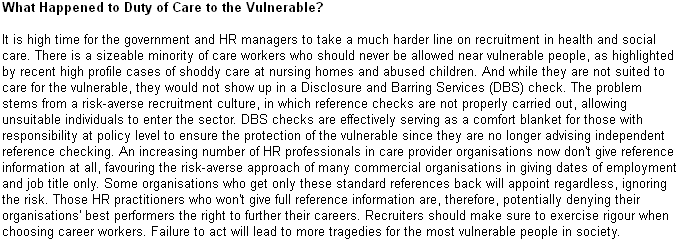
Read more


Read more


Read more

|
ADVERTISERS IN THIS EDITION |
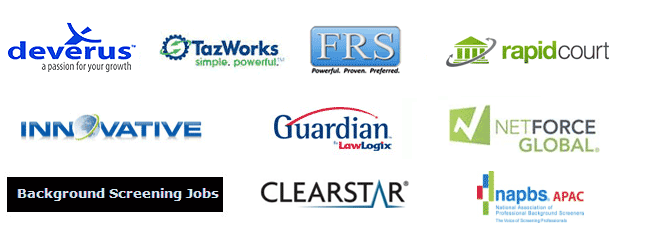

|  |
|
|
| |
|
Background
Screening Jobs |
|
Visit
the Job Board for the Employment and Tenant Screening Industry.
Here you will find resumes of people with industry experience
and employers seeking applicants with experience in Employment
and Tenant Screening and related businesses.
www.backgroundscreeningjobs.com


|
UPCOMING CONFERENCES, COURSES & EVENTS |
Feature
Education:
 |
FCRA
Basic Certification Webinar Series Update
The
FCRA Basic Certification program series is now available
for purchase.
For
more information |
2013 Events ( Click
Here to View full list of Events ) - Updated
Monthly
SHRM
State Conferences, visit
http://www.shrm.org/Conferences/StateAffilliateConferences/Pages/default.aspx
Drug
and Alcohol Testing Industry Association (DATIA), 2013 Training
Course Schedule, visit
http://datia.org
SAPAA
Training Institute Learning Events, http://www.sapaa.com/
CUPA-HR
Conferences: http://www.cupahr.org/
World
Federation of People Management Associations, Events,
http://www.wfpma.com/events/by-region#quicktabs-tab-view__events__page_3-4
|
 Hola!
Hola!















 Don't
Let Employment Investigations in APAC be the Weakest Link
in Your Background Screening Services.
Don't
Let Employment Investigations in APAC be the Weakest Link
in Your Background Screening Services. 








